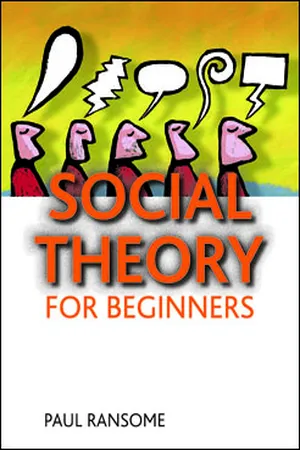
- 496 pages
- English
- ePUB (mobile friendly)
- Available on iOS & Android
Social theory for beginners
About this book
Treating social theory as an exciting intellectual journey in its own right, this new introductory-level textbook presents the key ideas and concepts in social theory together with an account of the intellectual background from which they emerged. Aimed at first-year undergraduates studying sociology and all related disciplines in the social sciences and humanities, it provides an introduction to the major questions and debates facing social theorists and sociologists. Clearly designed presentation and layout features help readers navigate their way around the material thus giving them the best chance of finding what they need quickly and easily. The book is supported by a companion website, containing additional materials for both students and lecturers using the book, which is available from the link above
Frequently asked questions
- Essential is ideal for learners and professionals who enjoy exploring a wide range of subjects. Access the Essential Library with 800,000+ trusted titles and best-sellers across business, personal growth, and the humanities. Includes unlimited reading time and Standard Read Aloud voice.
- Complete: Perfect for advanced learners and researchers needing full, unrestricted access. Unlock 1.4M+ books across hundreds of subjects, including academic and specialized titles. The Complete Plan also includes advanced features like Premium Read Aloud and Research Assistant.
Please note we cannot support devices running on iOS 13 and Android 7 or earlier. Learn more about using the app.
Information
Table of contents
- FRONT COVER
- TITLE
- DEDICATION
- COPYRIGHT
- OUTLINE CONTENTS
- LIST OF FIGURES
- PREFACE AND ACKNOWLEDGEMENTS
- INTRODUCTION Who is this book for and how do I use it?
- CHAPTER ONE: What is social theory?
- CHAPTER TWO: Where did social theory come from?
- CHAPTER THREE: Émile Durkheim and the coming of industrial society
- CHAPTER FOUR: Karl Marx, capitalism and revolution
- CHAPTER FIVE: Max Weber, rational capitalism and social action
- CHAPTER SIX: Talcott Parsons, functionalism and the social system
- CHAPTER SEVEN: Social interactionism and the real lives of social actors
- CHAPTER EIGHT: Western Marxism, Antonio Gramsci and the Frankfurt School
- CHAPTER NINE: Language, structure, meaning
- CHAPTER TEN: Discourse and power: post-structuralist social theory
- CHAPTER ELEVEN: Feminist social theory
- CHAPTER TWELVE: Reviving theories of modernity: Habermas, Giddens and Bourdieu
- CHAPTER THIRTEEN: Theories of modernity and postmodernity
- CHAPTER FOURTEEN: Reflexive modernisation: the global dimension and cultural theory
- CHAPTER FIFTEEN: The boundary problem in contemporary social theory
- GLOSSARY
- REFERENCES